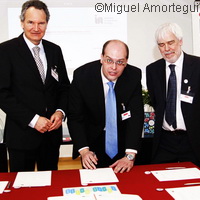New EU-funded research infrastructure for biology gets going
A new structural biology research infrastructure has just been launched, most likely meaning more breakthroughs in biomedical science are just around the corner. Fifteen of Europe's leading structural biology research institutes have come together to provide access to some of the most advanced technology in the world to academic and commercial scientists across Europe. The groundwork for establishing the network - titled 'Instruct' - was carried out with support from a EUR 4.5 million grant under the 'Research Infrastructures' Theme of the EU's Seventh Framework Programme (FP7). The Czech Republic, France, Germany, Israel, Italy, the Netherlands, Portugal and the United Kingdom have already signed up to the network, allowing researchers from these countries to start to access the shared technology. Instruct was formally launched by the European Commission's Director-General for Research and Innovation, Robert-Jan Smits, at a special ceremony in Brussels on 23 February. It is set to be a dynamic structural biology hub that provides an integrated infrastructure of cutting-edge technology, scientific expertise and pioneering training. The objective is to give European biologists a single point of access to all the technology and expertise they need to further their different research projects. Instruct Director Professor Dave Stuart from Oxford University commented: 'Never before have European biologists had a single point of access to all the technology and expertise they need to further their research. By bringing together the different disciplines, technologies and experts in European biology, Instruct will be helping to make the vision of truly integrated biology a reality for the first time.' Professor Dino Moras, principal investigator from one of the participating institutions, Institut de Génétique et Biologie Moléculaire et Cellulaire (IGBMC-CERBM) Instruct Centre in Strasbourg, France, comments on the benefits of connecting up the different biology sub-disciplines: 'Structural biology is at a critical stage where close integration with cell biology will open up new and powerful insights into treating diseases, from killer cancers to the common cold. Instruct will have a big impact on medical advances over the next decade.' Opening up access to the technology will give researchers a real boost and will be reflected in the quality of their eventual research outcomes. Examples of such technology are sample preparation for cryo-electron tomography using ion beam milling at the Max Planck Institute Martinsried in Germany, and the automated system for mammalian expression housed at Oxford University in the United Kingdom. In addition to the 15 main partner institutions based in Finland, France, Germany, Israel, Italy, Spain and the United Kingdom, there are also additional national centres affiliated to the Instruct network in the Czech Republic, the Netherlands, Portugal and Sweden. The participation of partner institutions from newer Member States such as the Czech Republic reflects the high quality of its structural biology infrastructure. The Czech National Affiliated Centre is supported by the European Structural Funds through the Central European Institute of Technology (CEITEC) and the Biotechnology and Biomedicine Center of the Academy of Sciences and Charles University In Vestec (BIOCEV) in the Czech Republic. One of the first researchers to road-test the Instruct network is Dr Colin McVey from the Universidade Nova de Lisboa in Portugal, whose research work focuses on structural immunology. 'I am delighted that my proposal has been accepted by Instruct,' comments Dr McVey. 'It will be of great advantage and benefit for me, and for other European researchers, to be able to access the best technology around Europe through a single application. I am looking forward to carrying out the work with the help of the technology experts and to further my research development.' At the moment, Instruct has an online community of over 500 scientists from 25 countries, and each user can adapt their profile depending on their different interests and priorities. There is a single user-friendly application process for accessing all available technology at all Instruct partner centres. Stephen Cusack, head of outstation of the European Molecular Biology Laboratory (EMBL) in Grenoble, France, called on researchers to join the Instruct community: 'The Instruct website, "the Hub" is at the heart of what Instruct can offer, from the research proposal application process and the database of technologies to the forums and collaborative workspaces. Additionally, it has a wealth of useful resources like the calendar of events, job adverts and information about funding. We are inviting researchers from all disciplines to register on http://www.structuralbiology.eu so that they can make the most of Instruct.'For more information, please visit:Instruct:http://www.structuralbiology.euCentral European Institute of Technology:http://www.ceitec.euBIOCEV:http://www.biocev.eu/en/

